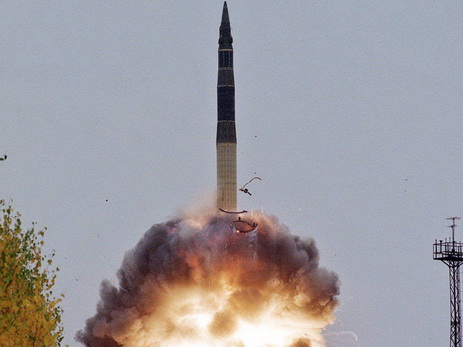DAILY CALLER: Nuclear Proliferation And The Dangers Of A Nuclear Armenia

By Justin Amler
Nuclear proliferation is an issue that persistently raises its ugly head — from the seemingly unstoppable Iranian nuclear program and North Korean ballistic missile tests to Armenians attempting to sell nuclear material to terrorists.
Since the end of WWII, the chief existential threat facing humanity was that of a nuclear confrontation. Borne from the ashes of World War II, the Cold War, with its spectre of a nuclear showdown, was made possible by Soviet intransigence and paranoia and the U.S.’s determination to stop Soviet expansionism. The threat of nuclear war was never far from our minds.
With the departure of the Soviet Union from the world stage, the nuclear threat did not dissipate as experts anticipated, but rather it decentralized. Today, the existential threat of a nuclear conflagration is far more dangerous and unpredictable with more actors involved, both nation states and terrorist organizations.
Iran, whose “deal” with the Western powers was considered the towering achievement of the Obama Administration, remains a dangerous country responsible for financing and supporting international terrorism and whose thirst for nuclear weaponry is at best delayed, but hardly quenched. It was a deal vigorously opposed by many in the Arab world, as well as Israel and then President-elect Donald Trump.
Adding to this existential threat, is the very real possibility that Armenia, whose Soviet-trained scientists and engineers have the access and capability to make nukes, has purchased Iskander 9K720 missiles from Russia, advanced missiles capable of delivering both nuclear and conventional payloads.
Long has Armenia been allied with Iran. A quarter century ago, it was with Iran’s materiale support (and the help of the Red Army) that Armenia fought Azerbaijan to standstill in the now a long-standing Nagorno Karabakh frozen conflict.
This relationship grows increasingly close and recently, Iran’s President, Hassan Rohani, visited Armenia, invited by Armenian President Serzh Sargsyan. The visit and topics discussed, illustrated the ever-bourgeoning ties between the two countries. Discussions even included the potential for lifting visa restrictions between the two countries, clearly increasing the risk of terrorists hiding unhindered in Armenia.
Germane to this growing threat are the false narratives of “allied nations” and “shared values” perpetuated by Armenian lobbying organizations, in concert with their “rewarded” boosters in Congress, who weave a tome of Armenia as a close and reliable ally of the United States.
The reality is that Armenia is a largely impotent relying on Russian largess. Russia controls Armenian borders and airspace, its economy and recently, Armenia President Sargysan publicly announced that his nation’s foreign policy would be farmed out to Russia. In terms of Iran, Armenia relies on it for technical knowhow, economic involvement and support.
Armenia’s possession of Iskander missiles is likely geared to cow militarily superior Azerbaijan or to precipitate a Russian-manipulated nuclear proliferation race in the Caspian region. Azerbaijan, feeling the pressure has recently purchase Israel’s Iron Dome missile defense system – a state of the art system that successfully shoots down Palestinian terrorists missiles.
Another disquieting factor were the arrests in Georgia of three Armenians attempting to sell weapons-grade uranium. When one considers reports from intelligence officials that Islamic State and other terrorist groups are attempting to obtain materials to build “dirty bombs,” it emphasises the dangers of nuclear materials falling into the wrong hands. Tellingly, these arrests occurred shortly before the outbreak of violence in Nagorno-Karabakh in April.
In terms of global security, alarm bells should be ringing, for this is not some far flung corner of an isolated part of the world, but a most strategic and vital area. Azerbaijan, blessed with energy resources and an affinity to the west, guarantees energy security to Europe bypassing any European reliance on Russia.
The absence of American engagement has allowed Russia to exercise its own strategic ambitions, filling another void left by a feckless American foreign policy. All, save Russia and Iran, hope for the Trump Administration to take back the initiative, and publicly support Azerbaijan in the interests of regional security, of which Azerbaijan plays a strong role.
Russia does not seem concerned about the moral implications of selling advanced weaponry to Armenia. In return, a powerless Armenia outsources its foreign policy, weapons and all, to Russia. If Armenia is armed with nuclear-capable missiles, and with the Nagorno-Karabakh conflict very much alive, it is a very real danger to the region as well as to the energy security of Europe. These missiles are like holding a lit flame to a gas leak – and the explosion could be disastrous.
As the foreign policy of President Donald Trump evolves, the world can hope for a focus on addressing aggressively bad actors like Russia, Armenia and Iran.
Justin Amler is a noted writer and commentator on international issues with special emphases on the Middle East, Eurasia and the former Soviet Union














